Key takeaways:
- Reparations politics involves addressing historical injustices and requires emotional acknowledgment beyond financial compensation.
- The history of reparations in Australia is tied to Indigenous rights movements, emphasizing the need for recognition of past wrongs.
- Global models of reparations highlight the importance of genuine acknowledgment and emotional restoration alongside financial restitution.
- Implementing reparations in Australia faces challenges including political will and societal attitudes, which complicate the dialogue on eligibility and distribution.

Understanding reparations politics
Reparations politics encompasses a complex interplay of historical injustices, socioeconomic disparities, and cultural reconciliation. It’s not just about financial compensation but also about acknowledging the deep wounds caused by colonization and discrimination. I often wonder, how can we truly heal when the scars of the past remain so visible in our communities?
Delving into the realm of reparations in Australia, it’s vital to understand the diverse voices that contribute to this conversation. I’ve met Indigenous Australians who share haunting stories of displacement and cultural loss, which have profoundly shaped their identities. It makes me think—are we ready to listen and act, or will we continue to sidestep the uncomfortable truths about our history?
The emotional weight of reparations politics is substantial, urging a reevaluation of traditional narratives. I remember attending a workshop where participants passionately debated what justice looks like. It struck me that the answers vary widely depending on personal experiences, and that’s where the heart of this dialogue lies—finding common ground amid our differences. How can we bridge these varying perspectives to foster genuine understanding and action?
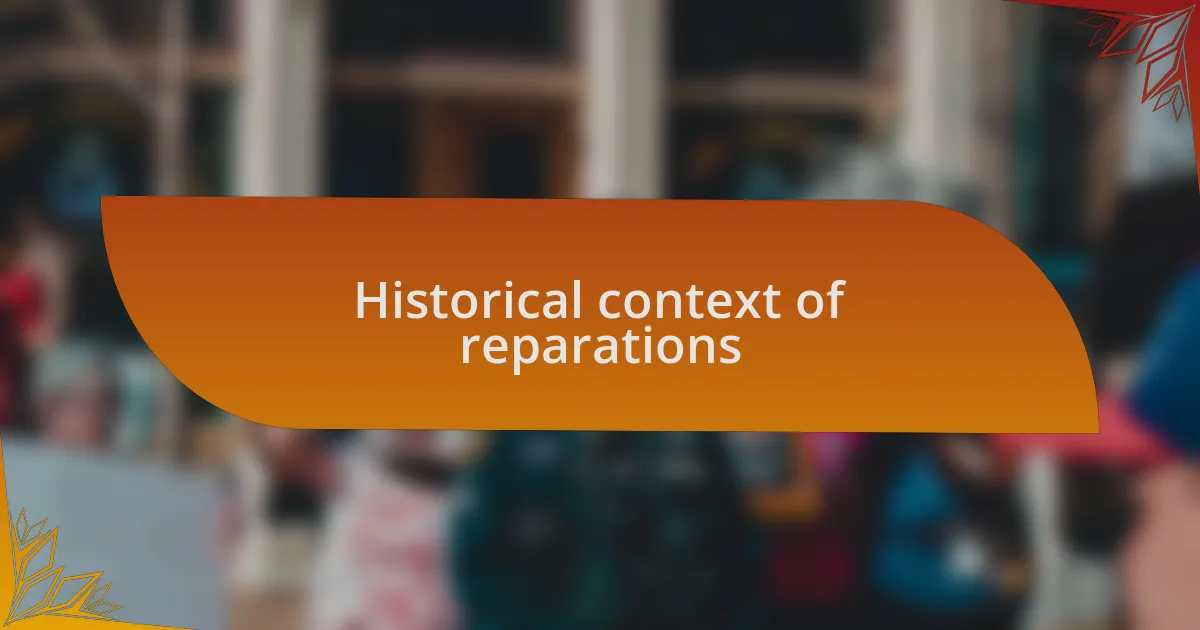
Historical context of reparations
The history of reparations in Australia is deeply intertwined with the impacts of colonization on Indigenous peoples. I often find myself reflecting on the tragic stories of Aboriginal communities that have endured land dispossession and systemic violence for generations. When I hear the term “reparations,” I think about how it calls for an acknowledgment of these past injustices, as well as the responsibility we all hold to address them.
In Australia, the conversation about reparations dates back to the early movements for Indigenous rights, especially during the 1970s when activism began to rise. I remember attending a seminar where a prominent activist spoke about the struggle for land rights and the emotional toll it has taken on individuals and families. This discussion illuminated my understanding of how these historical movements laid the groundwork for ongoing demands for reparations, not just in financial terms, but in restoring dignity and respect.
When we explore the historical context of reparations, it becomes clear that it’s not just a contemporary issue but a reflection of centuries of marginalization. Listening to firsthand accounts from Elders who lived through the Stolen Generations came as a profound reminder of the lingering trauma in our society. How do we reconcile this painful legacy while seeking a path toward justice? It’s an ongoing challenge, but one that requires our attention and engagement.
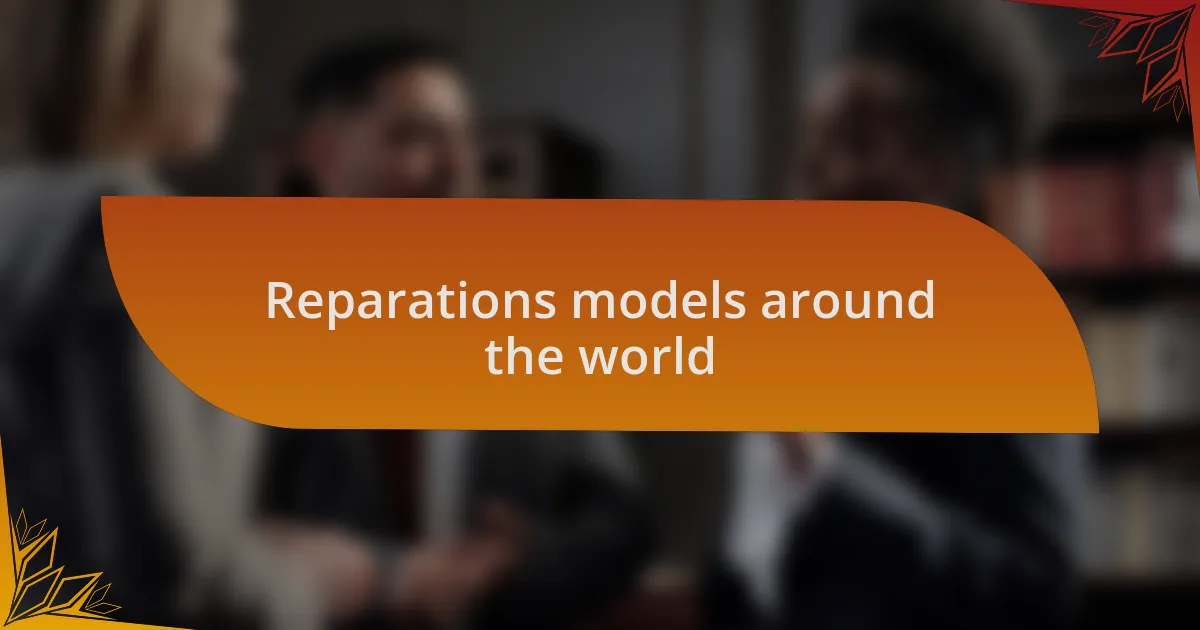
Reparations models around the world
Reparations models around the world provide a fascinating lens through which to understand justice and restitution. For instance, Germany’s approach to Holocaust reparations involved a series of payments to survivors and their families, which I find both commendable and complex. It raises the question: Can financial reparations truly heal deep-seated wounds, or do they merely serve as a temporary salve for historical injustices?
In South Africa, the Truth and Reconciliation Commission (TRC) aimed not only at reparations but at promoting healing through open dialogue about apartheid’s atrocities. Reflecting on this model makes me wonder about the balance between financial compensation and the emotional restoration that comes from acknowledgment and truth-telling. It’s an essential consideration for any country grappling with its own histories of injustices.
When looking at models like Japan’s reparations to former “Comfort Women,” I can’t help but feel a mix of frustration and hope. Although monetary compensation was offered, the lack of formal acknowledgment from the government left many victims feeling abandoned. This situation prompts a critical reflection: What good is reparation if it does not come with genuine acknowledgment of suffering? Wouldn’t it be more meaningful if reparations encompassed both financial support and heartfelt recognition of the pain endured?
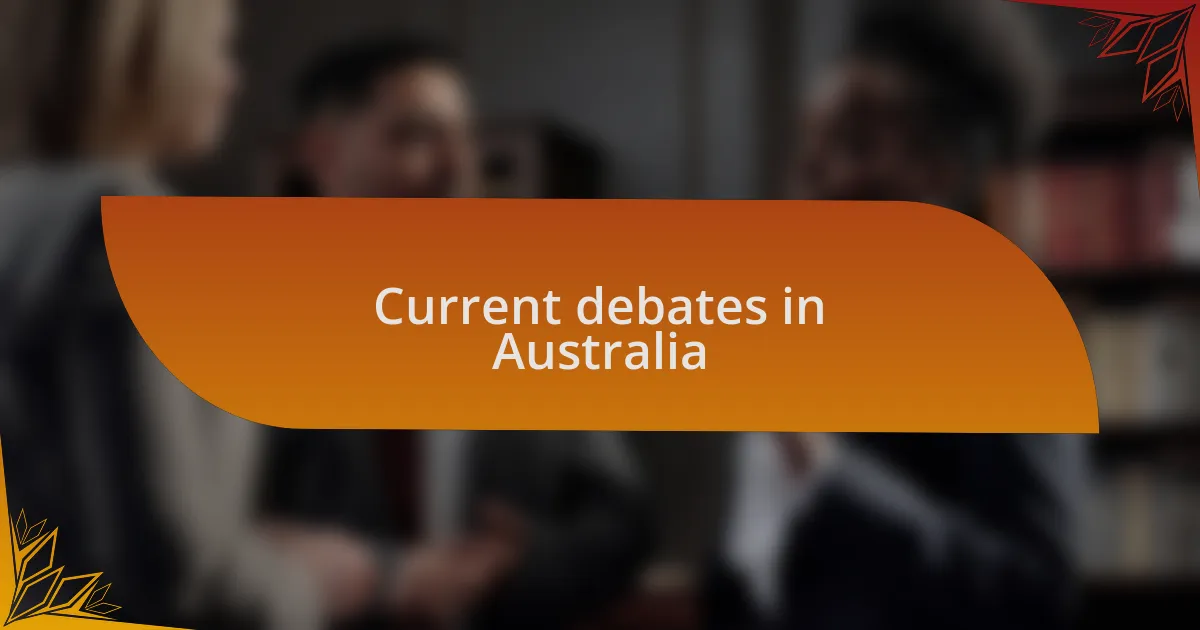
Current debates in Australia
The conversation around reparations in Australia is increasingly complex, particularly concerning Indigenous communities. I often find myself wondering how a nation can genuinely reckon with its past without acknowledging the systemic injustices faced by its First Peoples. Recently, debates have focused on whether reparations should be monetary, land-based, or involve comprehensive policy changes that ensure ongoing recognition and support for Indigenous rights.
One aspect that frequently emerges in discussions is the emotional weight of reparations. I recall a conversation with a friend who shared how the lack of acknowledgment for injustices caused generations of trauma within her community. It really struck me that reparations may not just be about financial restitution; they also need to include a commitment to truth-telling, healing, and meaningful engagement with those who have been wronged.
Moreover, the dialogue often raises questions about feasibility and public sentiment. Are Australians ready to embrace a reparative framework, or are there still entrenched attitudes that resist change? From my perspective, it’s crucial that we engage in these debates openly and honestly, as they will shape the nation’s social fabric for years to come.
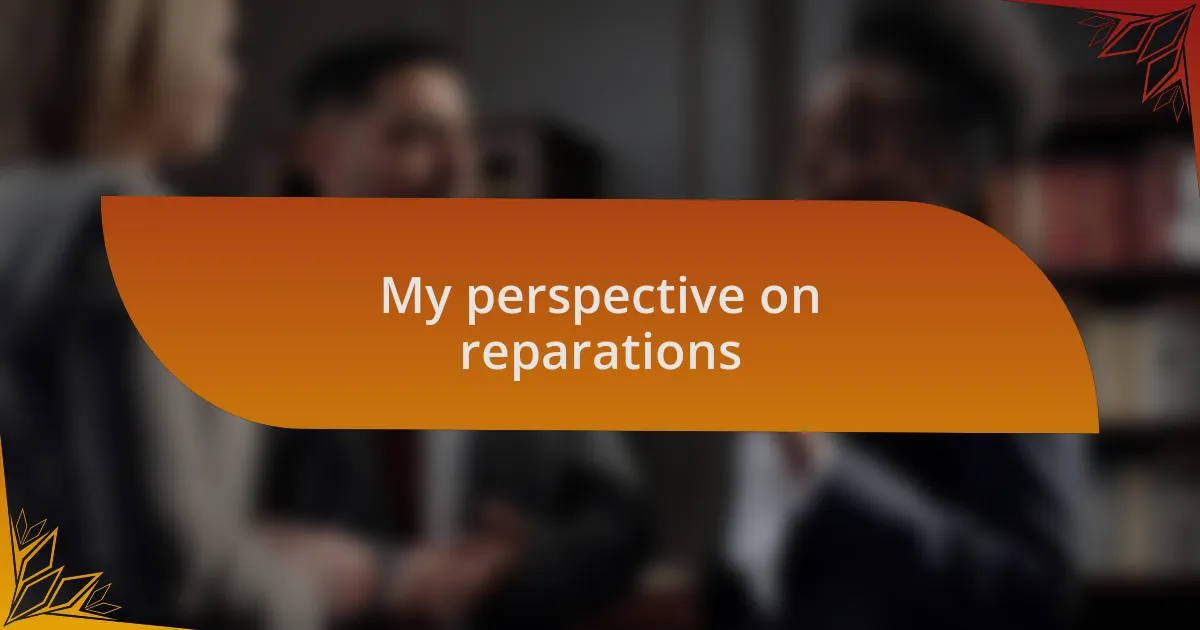
My perspective on reparations
When I think about reparations, I can’t help but feel that they represent a unique opportunity for healing and reconciliation. I once attended a community gathering where an elder shared the stories of her ancestors, detailing the profound impact of dispossession and cultural erasure. It made me realize that reparations should involve more than just financial compensation; they must also embrace a deep respect for Indigenous knowledge and culture.
I often wonder how we, as a society, can move forward without addressing these historical injustices head-on. For me, it’s essential that reparations include education and awareness initiatives that foster understanding among all Australians. Reflecting on my experiences, I believe that personal connections create a stronger foundation for empathy, and through storytelling, these connections can flourish.
In my view, reparations should also prompt a critical examination of our societal values. Are we willing to recognize the complexities of our history, or will we shy away from the uncomfortable conversations? Engaging with these questions is vital, as they challenge us to confront our collective responsibility and envision a future that acknowledges past wrongs while celebrating a more just and equitable society.
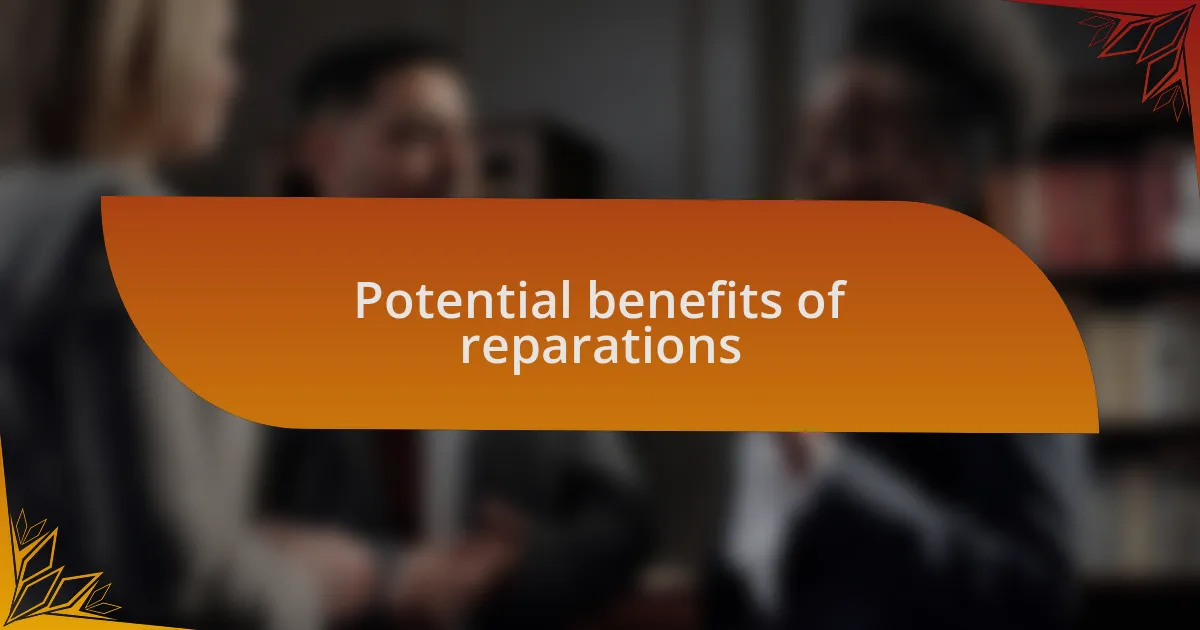
Potential benefits of reparations
The potential benefits of reparations extend far beyond monetary support—they can foster genuine healing within communities. I remember visiting a school where Indigenous perspectives were integrated into the curriculum. The transformation in students’ attitudes was palpable. They began to understand the richness of the culture and the pain of the past, which sparked respectful conversations. Isn’t it amazing how reparations can lead to a more informed and empathetic generation?
One crucial aspect of reparations is the opportunity for shared narratives. Reflecting on my own experiences at a cultural festival, I witnessed the power of storytelling in bridging gaps between different communities. When we listen to one another’s stories—especially those of marginalized voices—we begin to dismantle stereotypes and build trust. Why is it that we often hesitate to engage in these conversations? Perhaps it’s because we fear the truth; yet, addressing these issues openly can pave the way for stronger societal bonds.
Furthermore, reparations can stimulate economic growth and development in disadvantaged communities. I encountered a grassroots initiative aimed at supporting Indigenous-led enterprises, and the enthusiasm was infectious. By investing in local businesses, we not only uplift these communities but also create a ripple effect that can enhance the broader economy. Imagine what could happen if more Australians recognized this potential!
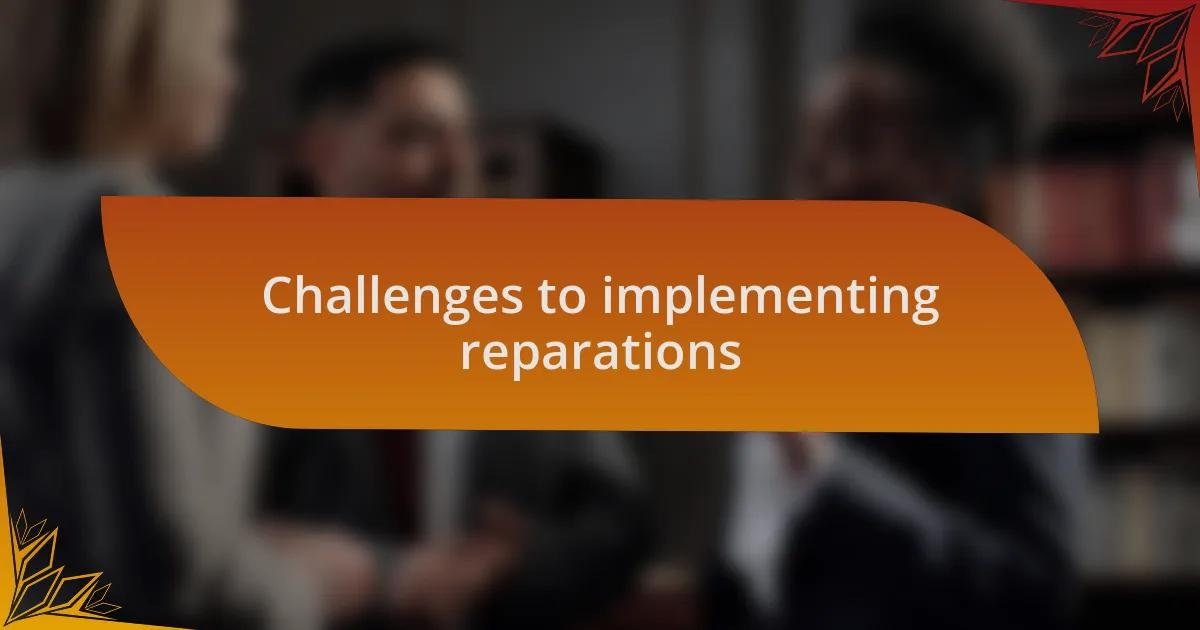
Challenges to implementing reparations
Implementing reparations in Australia faces significant challenges, particularly in the realm of political will. I remember attending a community meeting where people passionately debated the merits of reparations, only to see some local leaders shy away from the topic out of fear of backlash. This reluctance often stems from concerns about financial implications and the potential for division within the electorate. How can we expect meaningful change when political leaders hesitate to address the past?
Another hurdle is the question of who qualifies for reparations and how benefits should be distributed. I recall a conversation I had with a respected Indigenous elder who expressed frustration over the lack of clarity in this area. It made me realize that unclear parameters create confusion and may alienate those who genuinely deserve support. Shouldn’t there be a transparent method to determine eligibility? Without clear guidelines, the initiative risks being perceived as arbitrary, undermining its effectiveness.
Finally, the broader societal attitudes towards reparations add another layer of complexity. In my own experience, discussions around reparations often evoke strong emotions—ranging from guilt to anger to outright denial. I once attended a lecture where the speaker posed the question: “What price do we put on justice?” This resonated deeply with me, highlighting how fear and misunderstanding can hinder progress. If we don’t confront these uncomfortable truths, how can we ever move forward together?